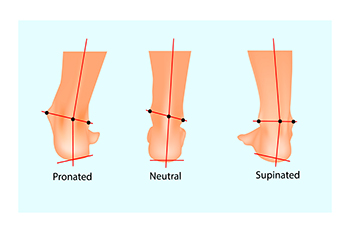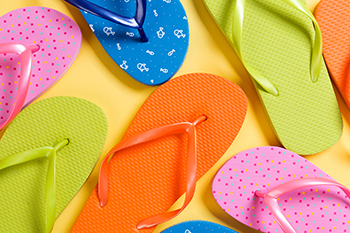

Overpronation is a common foot condition that can have a significant effect on your feet as well as your overall health. This malady occurs when the arches of the feet collapse excessively inward while walking or running. While some degree of pronation is normal, overpronation can lead to various issues. One of the most noticeable effects of overpronation is pain and discomfort. The excessive rolling of the foot can cause strain on the arches, leading to arch and heel pain. It can also contribute to problems in other body parts, such as shin splints, knee pain, and lower back pain as the misalignment in the feet affects the lower body's alignment. Over time, untreated overpronation can lead to more serious issues, including bunions, plantar fasciitis, and Achilles tendonitis. It also may be connected to development of hammertoes and Morton’s neuroma. Fortunately, podiatrists can provide solutions like custom orthotics and exercises to help alleviate the effects of overpronation and prevent further complications. If you suspect you may have overpronation issues, it is suggested that you make an appointment with a podiatrist for a gait evaluation and discussion on whether custom orthotics may be needed to keep your feet healthy and pain-free.
If you have any concerns about your feet, contact Dr. Edward D. Hutson from Easton, PA. . Our doctor can provide the care you need to keep you pain-free and on your feet.
Biomechanics in Podiatry
Podiatric biomechanics is a particular sector of specialty podiatry with licensed practitioners who are trained to diagnose and treat conditions affecting the foot, ankle and lower leg. Biomechanics deals with the forces that act against the body, causing an interference with the biological structures. It focuses on the movement of the ankle, the foot and the forces that interact with them.
A History of Biomechanics
Modern technological improvements are based on past theories and therapeutic processes that provide a better understanding of podiatric concepts for biomechanics. Computers can provide accurate information about the forces and patterns of the feet and lower legs.
Understanding biomechanics of the feet can help improve and eliminate pain, stopping further stress to the foot.
If you have any questions please feel free to contact our offices located in Easton, and Northampton, PA . We offer the newest diagnostic and treatment technologies for all your foot and ankle needs.
Although it may be tempting to wear flip-flops in warm weather, they are not the best choice of footwear for your feet. Flip-flops may be ideal for the beach, pool, spa, and shared showers, but you should avoid wearing them unless it is completely necessary.
Flip-flops only have a small strip of fabric holding your foot in place, but your toes need a better grip to keep your foot in place. The repetitive gripping can lead to an overuse of your muscles, which could result in tendinitis. This is only one of the many problems that stem from wearing flip-flops too often.
Flip flops aren’t good for extensive walking because they fail to offer arch support, heel cushioning, or shock absorption. As a result, people who wear flip flops are at a higher risk of experiencing an ankle sprain. Additionally, these shoes offer little protection for your feet, putting those who wear them at a greater risk for stubbed toes, glass cuts, and puncture wounds.
Although flip flops aren’t recommended for everyday use by anyone, it is especially important for diabetics to avoid them. A diabetic foot injury can easily become very serious, and it may even lead to amputation.
If you are experiencing pain from wearing flip-flops, you shouldn’t be hesitant to replace them with a more comfortable shoe that offers more support. If your flip-flop foot pain doesn’t go away, you should seek assistance from a podiatrist right away. It is possible that you may have a more serious foot problem such as a stress fracture or arthritis.

Flip-flops are popular summer footwear, offering ease and comfort on hot days. However, while they may be the preferred choice for many, it is essential to understand how they can affect your feet. The primary concern with flip-flops is their lack of support. They typically offer minimal arch support, and the thin sole provides little cushioning. This can lead to overuse injuries such as plantar fasciitis and Achilles tendonitis, as well as discomfort and fatigue during extended wear. Many flip-flops also have a lack of protection. Flip-flops expose your feet to hazards such as sharp objects, extreme heat, or slippery surfaces. This can result in cuts, burns, or accidents. Additionally, flip-flops often require a gripping motion of the toes to keep them in place, potentially leading to strain or imbalance in the foot's muscles. While flip-flops are perfect for short, casual outings, they should not be your primary footwear choice for long walks or activities that demand proper foot support and protection. Choosing shoes with better arch support and cushioning can help safeguard your feet against potential discomfort and injuries. If you would like more information about the negative effect wearing flip-flops can have on your feet, it is suggested that you speak with a podiatrist.
Flip-flops can cause a lot of problems for your feet. If you have any concerns about your feet or ankles, contact Dr. Edward D. Hutson from Easton, PA. . Our doctor will assist you with all of your foot and ankle needs.
Flip-Flops and Feet
Flip-flops have managed to become a summer essential for a lot of people. While the shoes may be stylish and easy to slip on and off, they can be dangerous to those who wear them too often. These shoes might protect you from fungal infections such as athlete’s foot, but they can also give you foot pain and sprained ankles if you trip while wearing them.
When Are They Okay to Wear?
Flip-flops should only be worn for very short periods of time. They can help protect your feet in places that are crawling with fungi, such as gym locker rooms. Athlete’s foot and plantar warts are two common fungi that flip-flops may help protect your feet against.
Why Are They Bad for My Feet?
These shoes do not offer any arch support, so they are not ideal for everyday use. They also do not provide shock absorption or heel cushioning which can be problematic for your feet. Additionally, you may suffer from glass cuts, puncture wounds, and stubbed toes since they offer little protection for your feet.
More Reasons Why They Are Bad for Your Feet
If you have any questions, please feel free to contact our offices located in Easton, and Northampton, PA . We offer the newest diagnostic and treatment technologies for all your foot care needs.